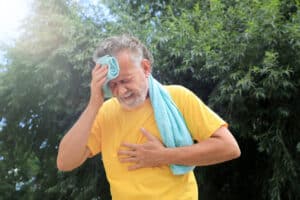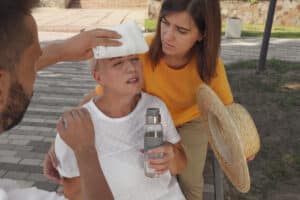Heart Health in the Summer Heat

In the past, you could count on September for cooling weather. It tended to present more like autumn, but recently it seems that September is identifying as a summer month. Eight of the top ten hottest Septembers in Colorado and seven of the top ten in Denver have been since 1990. With a record high September temperature of 101° F from 2020 and ten 90° F days recorded in September 2022, we can’t count on the end of the summer heat just yet.
While it looks like this September is unlikely to reach the heights of recent years, it’s still a good idea to review how to keep your heart healthy during the hottest days.
How Heat Impacts Your Heart
Like high altitude, heat makes your heart work harder. While in the case of altitude, your heart is working harder to distribute oxygen, when the temperature rises, your heart is sending more blood to your extremities to try to shed heat.
In addition, your body is losing moisture through evaporation of sweat, its primary cooling method. This can lead to dehydration and a dangerous drop in blood pressure. The risk is greater for people who are trying to manage heart conditions.
Hot Days and Heart Failure

People with heart failure aren’t pumping as much blood through their bodies. This means that your body has more difficulty controlling its temperature. You are also at greater risk because you are on a fluid restriction. Drinking more liquids helps your body maintain its temperature through sweat. When you’re on a diuretic (water pills), you can end up with low fluid levels on hot days, which can cause dangerous drops in blood pressure, leading to dizziness or even fainting.
Being outside in the heat can also lead to low sodium levels, which can negatively impact your heart function.
If you have heart failure, you should avoid spending too much time outside in hot weather and keep a watch out for the symptoms of heat stroke.
Medications Can Impact Your Ability to Beat the Heat
In addition to difficulties related to heart problems, your medications can sometimes lead to problems on hot days.
We’ve already talked about the impact of water pills on your fluid levels. In addition, beta blockers can slow your heartbeat, making it harder for your heart to pump the blood for cooling purposes. This makes you more vulnerable to heat stroke. Other medications can block your ability to sweat, which can increase your risk of heat stroke.
If you’re using a glycerol trinitrate (GTN) spray to help manage angina symptoms, be aware that it can cause small blood vessels to dilate, which can lead to dramatically lower blood pressure. This can make you feel dizzy or even pass out.
Arrhythmia on Hot Days
Just being out in the hot weather is unlikely to cause arrhythmia, although it can. The risk here is a loss of electrolytes through sweat, which can affect the body’s ability to regulate your heart rate. If you’re spending time out in the sun, remember that it’s not enough to just drink water: you need to consume fluids and foods that replenish your electrolytes. This doesn’t mean drinking sports drinks exclusively, but if you’re outdoor all day, adding one into the rotation makes sense.
However, the most common risk of arrhythmia on hot days comes from the same source as heart failure problems: the heat makes your heart work harder. When your heart is beating harder, it can make minor or latent arrhythmias more noticeable.
Watch for Signs of Heat Stroke

A major challenge in managing heat illness is that there may be a relatively short time from the appearance of symptoms to when they become dangerous, even deadly.
Some of the symptoms to watch for include:
- Cold, clammy skin
- Nausea and vomiting
- Fatigue
- Headaches
- Confusion or disorientation
- Muscle twitches
- Heat rash
- Swelling ankles
When you start to notice any of the preceding symptoms, get out of the heat as soon as possible. Most people should also consume hydrating liquids at that time. If you are managing heart failure, follow your doctor’s instructions about fluid intake.
Support for a Healthy Lifestyle at South Denver Cardiology
At South Denver Cardiology Associates, we know that managing heart health isn’t just about taking medications and getting surgery. Much of it is about making the choice to live a heart-healthy lifestyle every day.
We provide support for this through our diverse clinics, such as the Transitional Heart Failure Clinic and the Preventive Cardiology clinic, both of which help support people at elevated risk of cardiovascular complications during the hottest days. We are always here for you, not just for your procedures or your follow-up care; we’re ready to help answer questions as they arise.
For help living your best life despite your heart condition, please schedule an appointment at either our central location in Littleton, or any of our other locations in Englewood, Denver, Castle Rock, and Parker.
- 9 Tips to Reduce Holiday Stress - December 11, 2025
- 6 Tips for Exercising Outdoors with a Heart Condition - May 19, 2025
- Lifestyle Changes That Can Help Manage Arrhythmia - April 30, 2025
Sign Up
As with any health concerns, your specific treatment program should be discussed thoroughly with your primary care physician as well as any specialists who may need to be consulted – like a cardiologist.
Sign Up
